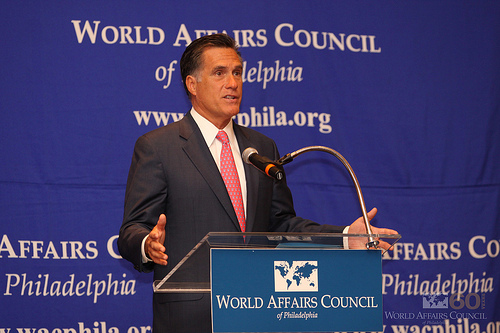
<a href="http://www.flickr.com/photos/wacphiladelphia/4558471727/">World Affairs Council of Philadelphia</a>/Flickr
ABC News’ Diane Sawyer kicked off Saturday night’s Republican presidential debate by asking the candidates precisely how many jobs they’d create in their first four years in the White House and how they’d do it. In a Gingrichesque move, Mitt Romney laid out a seven-point economic plan, one of which was making the federal government “get regulators to recognize their job is not to burden the system.” The other candidates continued the regulation-bashing, with Rick Santorum saying President Obama’s regulations killed jobs and Rep. Michele Bachmann (R-Minn.) claiming that “Barack Obama has given us a bevy of regulations that need to get repealed.”
Problem is, President Obama is hardly the regulation lover the GOP’s presidential candidates make him out to be. As Bloomberg News has reported, Obama approved 5 percent fewer regulations during almost three years in office than did his predecessor, George W. Bush. The cost of those regulations, meanwhile, hasn’t hit the same peak cost as those approved by George H.W. Bush in 1992. And looking across the past three decades, the cost of Obama’s regulations is nearly the same as the presidents before him when adjusted for inflation.
What’s more, a November study by the Center for Progressive Reform found that the Obama administration had watered down more regulations than the George W. Bush administration did at the same point in Bush’s first term as president. Obama’s regulatory aides changed 76 percent of rules coming out of federal agencies, the study found, while Bush aides tweaked 64 percent of rules.
On Saturday, in fact, the Obama administration’s propensity for whittling away at regulations was laid bare on the front page of the New York Times. After a multimillion-dollar lobbying blitz by the for-profit education industry, the Department of Education decided to weaken new rules overseeing for-profit schools, a regulatory tweak seen as a victory for industry.
Obama is no worse, in other words, than his Republican predecessors on issuing new regulations. While the US economy faces plenty of hurdles on the path to recovery, a unprecedented surge of new regulations is not one of them.











